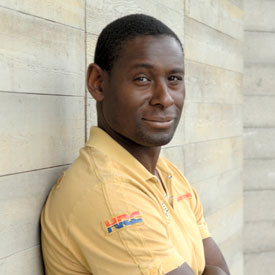Hollywood or bust for Black British actors?
Young black actors should head for America if they want to make it, according to acclaimed National Theatre star David Harewood – who says opportunities here are thin on the ground.

Head for Hollywood if you’ve got ambition, is David Harewood’s advice, as he warned that young Black actors would struggle to find roles in Britain to match their talent. And he should know: he’s finally won a breakthrough role on the acclaimed US drama Homeland, about the war on terror, which President Obama has already dubbed his favourite series on television.
America the bountiful
He’s not the only one. Stars like Adrian Lester, Chiwetel Ejifor and Marianne Jean-Baptiste have won prominent roles in the United States after experiencing plenty of frustration back here. Last night, Harewood criticised the “lack of authoritative, strong black characters” on British television – but across the Altantic, there’s a far wider range of roles, beyond the old stereotyped images of gangland violence, or grinding poverty.
As an artist of colour, I can use all of me here. Kwame Kwei Armah
Take Idris Elba, who just won a Golden Globe for best television actor for the lead role in BBC One’s Luther: a part he won after making his name across the Atlantic in The Wire. Adrian Lester, who’s just starred in another BBC series, Hustle, and has already enjoyed some Hollywood success alongside John Travolta in Primary Colours, is heading back to the States in search of wider opportunities. He told the Radio Times “At the moment, a lot of dramas with non-white actors in them feel as though they have to justify that presence.”
Institutional racism?
The accusations of racism in the British film industry are nothing new. Back in 1996, Marianne Jean Baptiste became the first black actor to be nominated for an Oscar, for her role in Mike Leigh’s Secrets and Lies. Yet she was left out of the group of young British stars who were invited to celebrate the 50th anniversary of the Cannes film festival a year later. Furious, she castigated the “old men” in charge of Britain’s film business – declaring “They’ve got to come to terms with the fact that Britain is no longer a totally white place where people ride horses, wear long frocks and drink tea.” She’s now a fully established star in the States, with a recurring role in the missing persons drama Without a Trace, and several film credits to her name.
It’s not just actors who are embracing everything America has to offer. The writer and director Kwame Kwei Armah has just moved to Baltimore to become artistic director at Centerstage. “As an artist of colour, as an artist who loves theatre, I can use all of me here, and there are very few other theatres anywhere in the world that can boast that.” he told a city magazine.
Creating new roles
But if the right roles don’t already exist, there are already moves to create them. An all-black production of Waiting for Godot opens this week at the West Yorkshire Playhouse in Leeds: an idea dreamt up by Patricia Cumper, artistic director of the black-led Tawala theatre company. She told Channel 4 News “Every time we cast a Tawala show, I am reminded how many brilliantly trained and multi-talented Black and Asian actors there are in Britain. Yet they do not find the number or range of roles they want, or in my opinion, deserve.” That mismatch, she said, made it perfectly natural – if sad – for them to turn to the United States to move their careers forward. “These are British actors who’ve had some of the best training in the world. Doesn’t Idris Elba’s Golden Globe show the way forward?” she said.
They do not find the number or range of roles they want, or in my opinion, deserve. Patricia Cumber, Tawala theatre company
America may well have a richly diverse culture, and a far more established black middle class. But the bright lights of Hollywood remain the ultimate prize for all actors, not just those from ethnic minorities. Back to Adrian Lester again: “It’s not possible to sustain a film career just by working in Britain. Black or white, whoever you are.” And of course Hollywood is as prone to racial prejudice as everwhere else: take the recent experience of the film director George Lucas. He told the Daily Show he’d had trouble getting funding for his new film, Red Tails, about a group of black US Air Force pilots who fought against segregation during the second world war, because there were no white actors in leading roles. “We don’t know how to market a movie like this”, he was told.
But the film did get made – and has already attracted a host of plaudits, not to mention six million dollars at the box office on its opening night last month. Commercial and critical success? For an all black cast? Now that’s something that Hollywood really will respect. And a little risk-taking this side of the Atlantic might not go amiss.